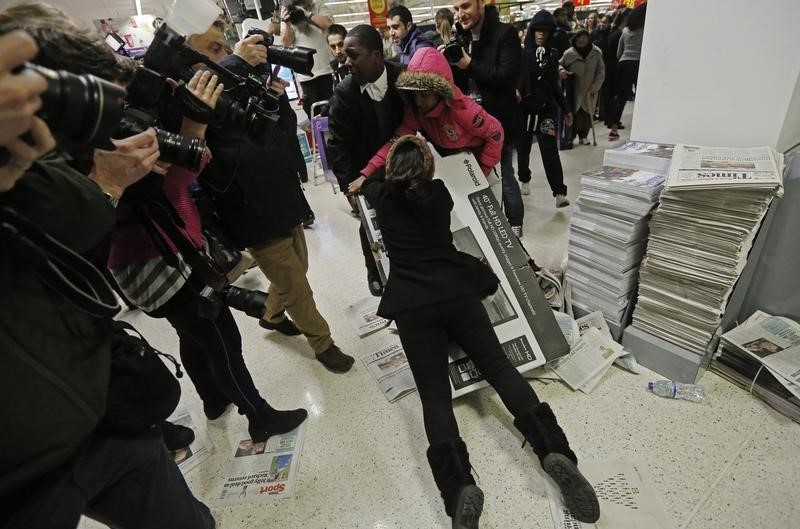By James Davey
LONDON (Reuters) - Britons literally fell over themselves for "Black Friday" bargains in November, so retailers need to make the discount day imported from across the Atlantic work for the industry.
Black Friday took hold in Britain in a major way for the first time last year, as store groups sought to match the promotions of big U.S. online retailers such as Amazon and use the event to kick-start interest in Christmas shopping.
But many were not prepared for the level of demand on Nov. 28, which saw shoppers queuing overnight, scuffles breaking out in stores, websites crashing and delivery operations overloaded.
Not only did that frustrate customers, but it also left many store groups selling more stock at a discount than they intended, and then finding there was less demand for full-price goods in the following weeks, hitting their profit margins.
Industry data showed the extent to which the traditional build up of sales ahead of Christmas was skewed. While Black Friday drove November retail sales growth to a three month high of 2.2 percent year-on-year, December's rise of 1.0 percent was the weakest outcome for that month since 2008.
With customers' expectations raised, and online retailers likely to keep up the pressure, there seems little prospect of Black Friday -- named after the day of the year when U.S. retailers traditionally become profitable -- fading away.
"We do not believe that the genie can be put back in the bottle," said retail researcher Conlumino.
So Britain's stores are going to have to do better, and that may mean learning from those that coped well, such as electrical goods chain Dixons Carphone.
It carefully planned targeted promotions with global suppliers on goods such as Samsung TVs, De Longhi coffee machines and Bose speakers, allowing it to achieve a sales boost while maintaining profit margins.
"I think it's here to stay. It's something that we need to plan for and get used to," said Dixons Carphone finance director Humphrey Singer of Black Friday.
"We pretty much start planning now for this year."
COPING STRATEGIES
Dixons Carphone's success was in contrast to the experience of many other general merchandise retailers on Black Friday.
"It caused a huge pull-forward of sales, it strained distribution networks, it undermined consumers' willingness to pay full-price at Christmas and it ruined perceptions of online delivery reliability," said independent retail analyst Nick Bubb.
Marks & Spencer, Britain's biggest clothing retailer, was the highest profile casualty, with its huge distribution centre in Castle Donington, central England, thrown into chaos.
Unable to cope with the spike in demand, automated picking and packing failures delayed the delivery of goods ordered online. Disappointed customers lambasted the firm on social media and a subsequent loss of sales was a major factor in the firm missing forecasts.
Chief Executive Marc Bolland lamented that at any other time of year "you don't get that artificial Christmas tree, wrapping paper and a dress together in one order."
But he knows it's the company that must adjust.
"If consumers like to shop in that way more, then as retailers we need to find answers to it," he said.
Analysts say this year retailers may put more focus on spreading the home delivery of goods ordered on Black Friday over a longer period and on increasing the appeal of "click and collect" services, where ordered goods are picked-up in store.
Household goods chain Argos missed Christmas sales forecasts after reining in promotions in the wake of Black Friday. That protected profit margins but hurt sales.
Chief Executive John Walden, who as an American is a veteran of Black Friday, reckons retailers will be more selective about what they put on sale this year -- "balancing the things that make money versus the things that may not."
Black Friday delivered the biggest week of sales in department store John Lewis' (JLP.UL) 150-year history.
Its boss, Andy Street, says the event will stay but reckons it may be tempered this year, perhaps more focused around its traditional electricals heritage.

"Customers got a very good deal," he said. "But standing back from it all, you actually have to say: 'Is it good for the industry to concentrate so much business in that one day and then have a relatively flat period afterwards?' The answer is probably not."